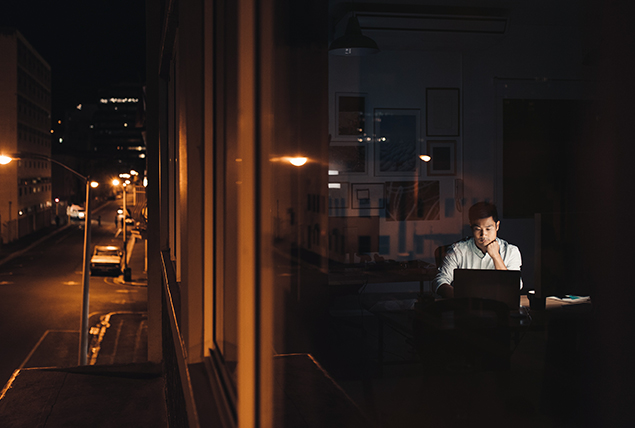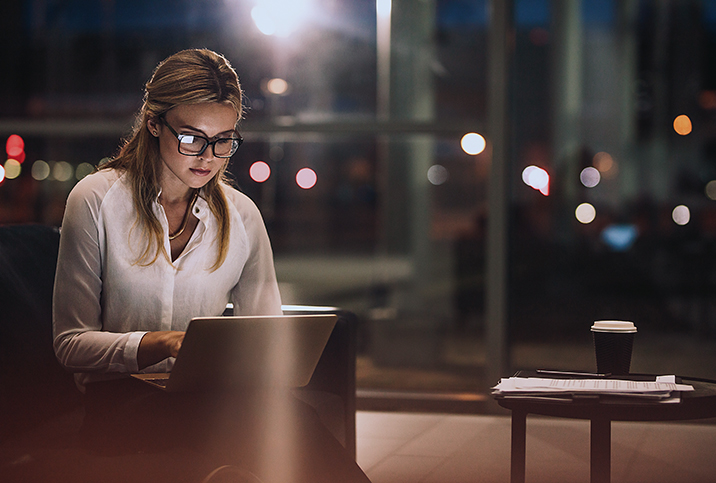How to Stay Awake, If You Must

There is a wide range of reasons someone would want or need to stay awake, from work commitments to medical conditions, said Dan Ford, M.A., a certified sleep psychologist in New Zealand who specializes in the treatment of behavioral sleep disorders.
"One of the most obvious reasons to be awake at night would be shift work," he said. "Other work-related reasons could be dealing with an emergency or critical incidents. For example, when I was in the military, sometimes operations or time-critical events would require me to work around the clock. In the clinic, we also see people who are simply very busy and have a lot on their plate and stay awake simply to work and stay on top of work."
Non-medication ways to stay awake
Ford noted the most apparent non-medicated way to stay awake is caffeine, primarily a cup of Joe. While not a prescription medicine, caffeine is considered a stimulant.
"Caffeine blocks the action of the neurotransmitter adenosine, which causes you to feel sleepy," Ford said. "Caffeine is in coffee, black and green teas, some soft drinks, chocolate, including hot chocolate, energy drinks and many pre-workout supplements."
Aside from caffeine, strategic naps are recommended to shift workers and other people in need of remaining alert and awake.
"Typically, a short nap of around 10 to 20 minutes refreshes a person without impacting their ability to fall asleep at night," Ford said. "The closer the nap [is] to your main sleep time, the more likely it will delay your ability to fall asleep. So a longer nap is also an effective way to reduce sleepiness and keep you awake."
Another element assisting someone in staying awake is bright lights. Think about the 24-hour casinos in Las Vegas, permanently illuminated with blazing vibrance.
"Bright light alerts the master circadian clock in the brain and this suppresses melatonin production and signals 'daytime/stay awake' to the body," Ford said. "Nicotine is also a stimulant and tends to promote wakefulness."
Many of the actions you're told not to do before going to bed can be exactly what you need to stay awake. For example, looking at your cellphone, watching TV and keeping lamps on can all help you stay awake.
Eating food is another way to stay awake. Foods containing guarana, ginseng and taurine all tend to be stimulating and promote wakefulness, Ford said.
"Large meals tend to keep people awake as it's hard to fall asleep when the body is busy digesting food, not to mention it's uncomfortable," he added. "Anecdotally, spicy food tends to upset people's stomachs and keep them awake."
How sleep impacts your sexual health
"There is growing evidence in male and female humans that sleep deprivation impairs reproductive function," Ford said, referring to a 2022 study of males that found a reduction in circulating testosterone but not spermatogenesis, or the production of sperm.
He noted sleeplessness among female shift workers has been shown to suppress melatonin production and activate the hypothalamic-pituitary-adrenal (HPA) axis (i.e., the stress system), which can result in early pregnancy loss, failed embryo implantation, failure to release the egg from the ovary during menstruation and the absence of menstruation.
"Sleep deprivation is also associated with altered sex hormone secretion in females, which can lead to infertility," Ford added.
Not only does a lack of sleep impact sexual health physically—such as maintaining erections and normal sperm counts—tired people just don't have sexual desire. Even if the physical elements are working, the mental and energy parts might not be there if one or both partners aren't getting enough sleep.
In terms of overall bodily health, after a prolonged period of inadequate sleep, you get increasingly sleepy and it's harder to stay awake.
"Fatigue may increase and a person will complain they have no energy and feel exhausted," Ford said. "Mood tends to flatten, with pleasant mood decreasing and flat and low moods becoming predominant. Anxiety can rise. Mental performance declines and simple reaction times start increasing. Concentration and attention lapses increase, and there is an overall increase in HPA axis activity, leading to a rise in circulating levels of stress hormones, such as cortisol."
According to Ford, there is growing evidence of bodily systems such as glucose and metabolism being impacted, leading to changes in appetite and weight gain.
"In short, there are multisystemic or system-wide impacts from sleep loss," Ford explained. "Prolonged sleep deprivation can contribute to hallucinations and, potentially, temporary psychotic states for some individuals."
Bodily systems begin to shut down, and eventually, your body will need sleep and you won't have control over it. This can be a dangerous situation if you're staying awake to work an occasional night shift. Once the adrenaline of being at work wears off and it's time to drive home, your body could experience extreme exhaustion, causing you to start falling asleep at the wheel.
The immune system is at risk from a lack of sleep. Scientific evidence is building, showing sleep has powerful effects on immune function, and sleep loss can affect different parts of the immune system, which can lead to the development of a wide variety of disorders.
"For example, a modest amount of sleep loss—say, restricting the time allowed for sleep to four hours for one night—reduces natural killer cell activity to an average of 72 percent, compared to natural killer cell activity in participants who had a full night's sleep," stated a 1994 study.
The Centers for Disease Control and Prevention (CDC) noted sleep loss is related to a higher risk for infection. For example, restricting sleep to four hours per night for six days, followed by sleep for 12 hours per night for seven days, resulted in a greater than 50 percent decrease in the production of antibodies to influenza vaccination.
About sleep chronotypes
There is the idea that every person can be categorized in one of four sleep chronotypes: dolphin, lion, bear or wolf. The chronotype is purportedly built into your DNA, and no matter how hard you try, you just can't go against your biological sleep chronotype. For example, if you are a lion, it is believed you are an early riser and most productive during the first half of the day. But if a lion were to try to stay awake longer, it just wouldn't work.
But are these chronotypes real?
"Maybe not," Ford said.
He explained that chronotypes themselves are real, but the scientifically recognized chronotypes are morning types (larks), evening types (owls) and those in the middle (hummingbirds or third birds). He said the chronotypes of dolphin, lion, bear and wolf were promoted by clinical psychologist Michael Breus.
"It appeared he was attempting to overlay personality variables onto the chronotypes since both have genetic components and will influence individual differences," Ford said. "For example, someone higher on emotional sensitivity are more likely to have more negative mental health experiences, but then so will late-night chronotypes, so mixing these you get a dolphin. It makes sense, but is it scientifically recognized? Not to my knowledge."


















